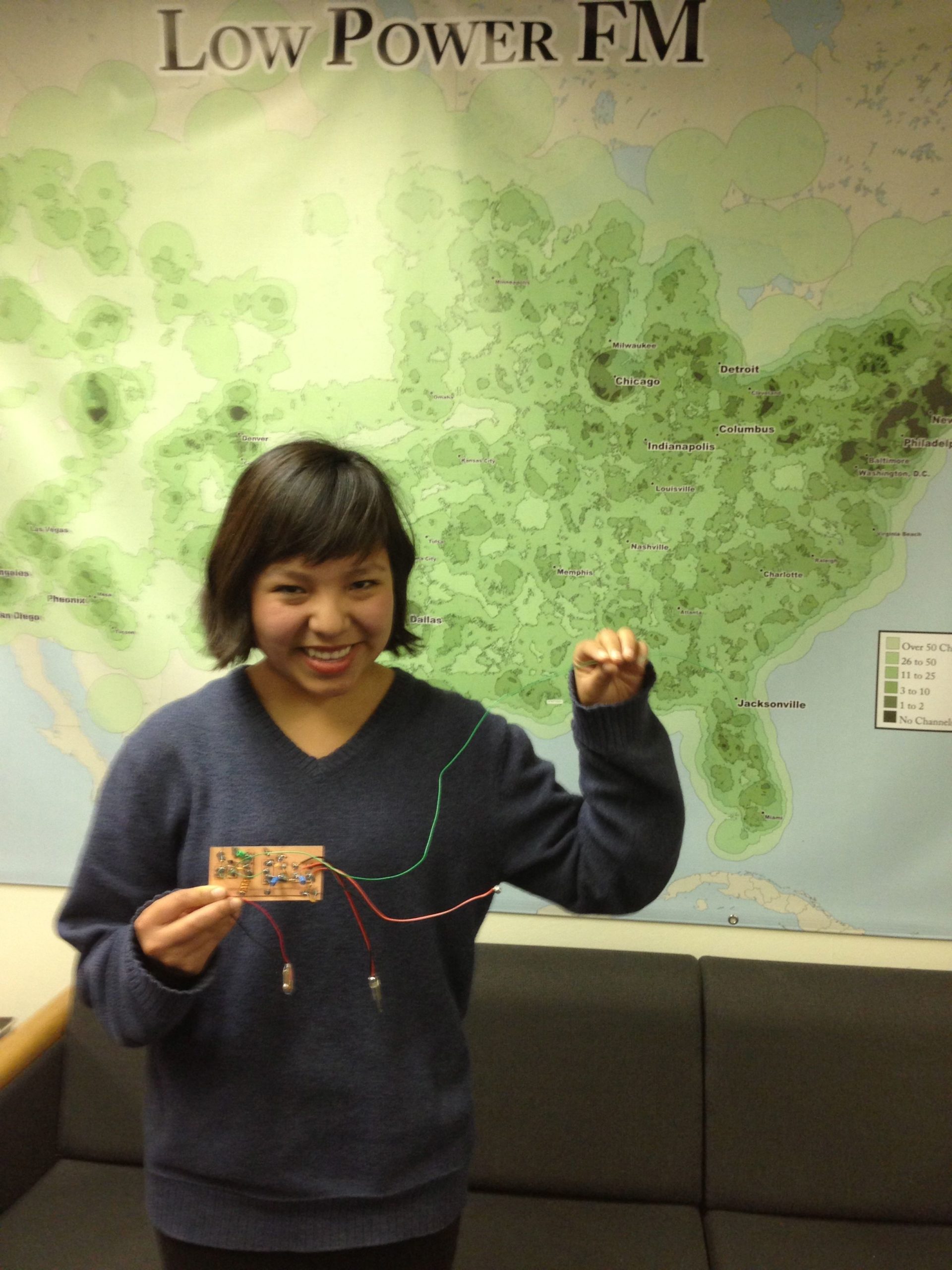This October, community groups and nonprofits across the country will have a onetime opportunity to apply for a low power FM license to run their own radio station.
This is especially significant in cities, like Philadelphia, because it’s the first time in 30 years that the Federal Communications Commission has opened up the airwaves in urban markets — airwaves that are largely monopolized by corporations like Clear Channel, which owns about 850 radio stations in the U.S.
More than a decade in the making, this national moment can be traced back in part to the work of a seven-person nonprofit right in Center City: The Prometheus Radio Project. It’s a part of their “Reclaim the Airwaves” movement.
“We helped craft this moment through the advocacy work that we’ve done,” said Julia Wierski, development director of the Prometheus Radio Project.
Founded in 1998, the Prometheus Radio Project grew out of Radio Mutiny, a pirate radio station in West Philly. Radio Mutiny had a tumultuous relationship with the FCC, which had repeatedly ordered the station to shut down, until the FCC decided to allow low-power FM (LPFM) stations — noncommercial stations that reach a smaller audience. That’s when the pirates “decided to raise the white flag,” as Wierski put it, and work with the FCC.
Prometheus, which moved from its West Philadelphia church basement headquarters to the Gershman Y building in Center City just last fall, lobbied the government for more than a decade to get to this point. Now it’s helping community groups — locally and nationally — prepare for the application process.
Philly’s radio broadcasting makeup
The Philly market is diverse compared to other large markets. A quick (and not exhaustive) rundown from Prometheus’ Wierski.
Commercial stations
WOGL (Owned by CBS Radio, inc.),
WIOQ, WUSL, WDAS, WISX, WRFF (owned by Clear Channel)
WPHI, WPPZ, WRNB (owned by Radio One, Inc)
WPEN, WMGK, WMMR, WBEN (owned by Great Media Inc.)
Noncommercial stations
WKDU, WXPN, WHYY, WRTI
College stations
WPRB, WKDU, WXVU, WBZC, WDBK, WGLS
Stations owned by smaller companies (not national networks)
WVLT – a local station, owned by Clear Communication, based out of Vineland, NJ that reaches into the Philadelphia market
Community radio stations
WPEB
Since Prometheus’s work has a national bent, what is it about Philly that makes it the right place to do this kind of work?
In Philly, there was a “perfect storm of opportunity,” Wierski said, citing its “vibrant social justice and activist community” and the fact that the local broadcasting makeup is so varied, with commercial and non-commercial stations, college stations and stations owned by smaller companies (see sidebar).
“When you’re presented with so many options, it expands your imagination,” Wierski said. “You wonder: what’s missing?”
Check out our primer to community radio and why it matters in Philly below.
Why does community radio (LPFM) even matter in Philly?
Radio is the most accessible form of media, said Jeff Rousset, Prometheus’ national organizer, adding that estimates say that more than 90 percent of people in the country listen to radio regularly, though growing streaming and other web-offerings complicate the future of LPFM and other terrestrial radio. Given Philly’s digital divide problem, where 2010 census data reported fewer than half of Philly households had access to the Internet, radio is a powerful form of media in the city.
Wierski estimates that the community radio stations that open up in Philly will be able to reach one million people. How many can listen, of course, is different than how many will listen, which is another question altogether.
What’s more, community radio offers people local control of the airwaves, Rousset said.
“Imagine turning on the radio in Philly and hearing local voices talking about issues in Philly,” he said. He acknowledged that there is some local reporting on the Philly airwaves now, but there is “less space devoted to local reporting.”
Are there any community radio stations in Philly?
There’s one: WPEB 88.1 FM. Read more about it in our story here.
How many stations are opening in Philly and what’s the interest been like?
Up to three radio stations will be available in Philly, said Rousset, and there has not been a huge amount of local interest. That isn’t abnormal, Rousset said, because it’s going to cost more money (due to mandatory engineering studies and other expenses) to start a community radio station here than in a rural area.
The biggest markets, like Philly, are the most saturated with stations, Rousset said, and you literally can’t “squeeze more stations in” without them interfering with other stations. That’s why so few stations will open in the city.
What’s the timeline like?
After the application window closes in October, it’ll take the FCC anywhere from one to three years to decide who gets the stations, Rousset said.
How can I apply?
Get more information and fill out an applicant profile with Prometheus here.
How can I help?
Prometheus needs volunteers of all kinds: engineers, non-technical people, you name it. Visit Prometheus’ site RadioSpark in order to learn more.
Find our previous coverage of the Prometheus Radio Project here.







